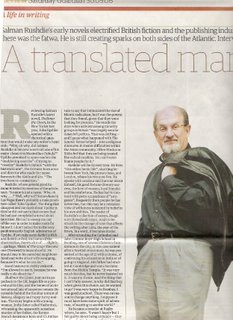
He is so 'out there', you're almost taken aback when you see his profile on 'a life in writing' -one of the new features of the Review section of the fairly new look UK Guardian. Was one required? you ask yourself. Still, what can it hurt? You delight in reading one more thing about Salman Rushdie anyway, even when you've read nearly all there is to read about the man.
The author of Midnight's Children, starts with an 'On Yer Bike!' broadside on John Updike, who questioned, in a review of his latest work, Shalimar the Clown, "Why, oh why, did Salman have to call one of his major characters... Maximillian Ophuls?"
Rushdie sniffs: "A name is just a name. 'Why, oh why ... ?' Well, why not? Somewhere in Las Vegas there's probably a male prostitute called 'John Updike'. The thing that disappointed me most about Updike is that he did not say in that review that he had just completed a novel about terrorism. He had to sweep me out of the way in order to make room for himself. I don't subscribe to the very predominantly English admiration of Updike. If you take away Rabbit is Rich and Rabbit at Rest, and some of the short stories, there's a lot of ... slightly ... garbage. Think of The Coup! The new one [Terrorist] is beyond awful. He should stay in his parochial neighbourhood and write about wife-swapping, because it's what he can do."
Ouch! Rushdie adds: "I'm allowed to say it, because he was really rude about me."
The piece continues on the self-confessed 'translated' man, Rushdie, whose "literary enthusiasms embrace problematical writers - from a colonial point of view - such as Conrad and Kipling. "Lord Jim is a book that I kind of hated but couldn't get out of my head. The Nigger of the 'Narcissus' is awful, but unforgettable." Similarly, he has had "many of the difficulties with Kipling that a lot of people from India have, but every true Indian reader knows that no non-Indian writer understood India as well as Kipling. As a child I loved the Jungle Books, long before I realised that there were ideological problems with them. If you want to look at the India of Kipling's time, there is no writer who will give it to you better."
Rushdie is pleased his work has had an impact, but he insists that books don't save the world; when he is writing, he simply aims for the modest goal as any other writer - to make the story work.










.jpg)





No comments:
Post a Comment